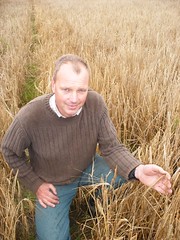 Autumn came in September and it really was the “Season of Mists and Mellow Fruitfulness”. Ideal growing weather has meant massive crops of fruits: apples, pears, plums and damsons. While huge bunches of blackberries hung in the hedgerows. We have gathered lots of sloes from the blackthorn plant to put in our slow gin for Christmas. Very good it is too - hic!
Autumn came in September and it really was the “Season of Mists and Mellow Fruitfulness”. Ideal growing weather has meant massive crops of fruits: apples, pears, plums and damsons. While huge bunches of blackberries hung in the hedgerows. We have gathered lots of sloes from the blackthorn plant to put in our slow gin for Christmas. Very good it is too - hic!
When the frustrating wet and soggy August ended, September brought an Indian Summer: glorious sunny days meant harvest could resume and was finally completed on 10th September. The wheat and barley was cut dry enough to store without drying. Yields have been OK but not much better than average. Potato yields have been very good due to ideal growing conditions: rain and hot sun, then more rain. But big yields mean low prices. Prices for all farm products have crashed this year for various reasons. There has been a huge harvest in the USA, record yields of soya, maize (corn) and wheat have driven down prices, and ironically, after the huge success of fracking, there is a surplus of gas in the USA, so the millions of tons of maize and wheat that went into ethanol production and bio-diesel for fuel, is now on the market depressing prices. There have been good harvests in all the main wheat producing areas of the world, Australia, Argentina and Russia/Ukraine. Russia has been a strong seller of wheat out of Ukraine. Black sea wheat, as it is called, is always priced to sell, meaning it is always the cheapest, so pulls down the price.
When last December, Russia put a tax on wheat exports because they were worried they would not have enough wheat to see them through the winter, the price started to rise for next years harvest.
Russia’s game of cat and mouse with the West continued, when during August last year, it imposed a one year blanket ban of all fruit, veg, meat, fish, milk and dairy imports from the US, EU, Australia and Norway with immediate effect. Whereas the UK exports very little to Russia, other EU members export a lot. So all these products will be circulating all around Europe trying to find a home, therefore depressing prices further.
All our products have seen prices sharply depressed this year for various reasons. Beef cattle prices were down £200 per head in the summer. This is due to the £ strengthening against the euro: making beef imports cheaper, mainly from Eastern Europe and Poland. Though now the price has started to improve.
Oil seed rape prices are down £100 per tonne on last year due to a record harvest worldwide, and less demand for biofuels.
Potatoes – where to start – The worst year I can remember! Huge yields due to ideal growing conditions and slow demand from consumers. We couldn’t give our potatoes away in the Autumn, so we fed a lot to our beef cattle: they love them! The Potato Council estimate there is a surplus of 1 million tonnes of potatoes this year in Britain.
Milk price down 7/10p a litre. This is about a 30% drop: due to a 5% increase in production this year because of ideal grass growing conditions. Plus the Russian ban has lead to a huge surplus. Thomas Oultram explained very clearly in last months Kingsley News how the price cut would affect him and his family.
ANYWAY, enough of moaning about last year! We must look forward to this year. Farmers are nothing, if not optimistic. So this year has got to be better. We have past the equinox now, the days are getting longer, and Spring is just around the corner. Daffodils are poking through, and the countryside will soon burst into life.
HAPPY NEW YEAR TO YOU ALL.
Graham Warburton - Warburtons Farms 01928 788329
Please e-mail me on the following address with any comments: This email address is being protected from spambots. You need JavaScript enabled to view it.
‘Like’ WARBURTONS FARMS ON FACEBOOK and keep up to date with the seasons activities.

